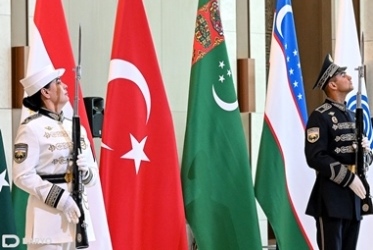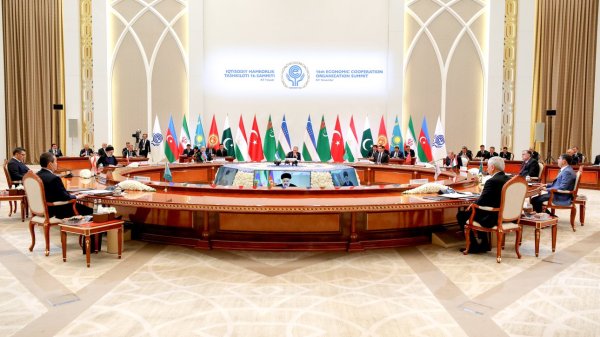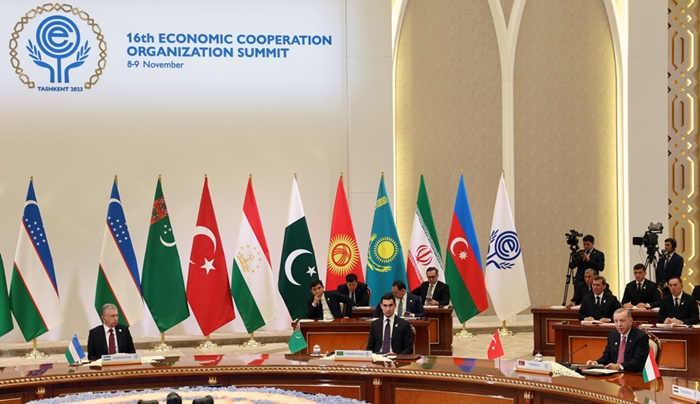nCa Report – Elvira Kadyrova
On 9 November 2023, the 16th summit of the Economic Cooperation Organization was held in Tashkent under the motto “Together towards economic stability and development”.
The summit, chaired by President of Uzbekistan Shavkat Mirziyoyav, was attended by:
- Azerbaijan – President Ilham Aliyev
- Iran – President Ebrahim Raisi
- Kyrgyzstan – President Sadyr Japarov
- Tajikistan – President Emomali Rahmon
- Türkiye – President Recep Tayyip Erdogan
- Turkmenistan – President Serdar Berdimuhamedov
- Pakistan – Prime Minister Anwar ul-Haq Kakar
- Kazakhstan – Prime Minister Alikhan Smailov
- ECO Secretary General Khusrav Noziri.
The summit reviewed the activities of the Organization in the post-pandemic period, including, in particular, the progress made in regional trade, transport, energy, tourism, agriculture, etc.
ECO leaders called on the countries to be more receptive and responsive to the mutual implementation of the organization’s initiatives to ensure sustainable progress and development in the region.
In this regard, the summit participants highly appreciated Uzbekistan’s initiatives to accelerate the process of regional economic integration, including the country’s proposal to create an International Industrial Exhibition within the ECO and the proposal to host the first exhibition in Uzbekistan in 2024.
In addition, the leaders stressed the need to expand international cooperation to create greater harmony between nations so that current geopolitical challenges can be collectively addressed.
Emphasizing the role of parliamentary diplomacy, which continues to grow in global relations, ECO recognizes the importance of the Parliamentary Assembly of ECO Member States (PAECO).
The summit participants also discussed the current situation in Afghanistan, calling for increased humanitarian assistance to solve the serious socio-economic problems of the Afghan people. Considering the escalation of tension in Palestine and the deterioration of humanitarian conditions in Gaza, ECO leaders called on the international community to take more serious and fruitful response measures.
Moreover, the names of ECO Award Winners were also announced during the Summit in recognition of the individuals’ scientific and educational services.
Following the summit, the Tashkent communique was adopted.
The chairmanship of the ECO has passed to Iran. Azerbaijan will host the next summit.
Turkmenistan is ready to provide the ECO region with gas and electricity
President of Turkmenistan Serdar Berdimuhamedov, speaking at the 16th meeting of the Economic Cooperation Organization in Tashkent, announced country’s readiness to increase gas and electricity supplies to the ECO countries.
“Turkmenistan is ready to increase the volume of natural gas and electricity supplies to the ECO countries through the currently available capacities and which will be built in the future,” the President of Turkmenistan said.
“The fact that the global energy markets are in a generally unstable state is one of the main tasks for developing an effective model of ECO cooperation,” Berdimuhamedov stated.
“First of all, it is necessary to meet the growing energy needs of our countries to increase the capacity of new industrial complexes and agriculture, the construction of infrastructure facilities and the launch of joint production projects,” the President of Turkmenistan stressed.
He underlined that Turkmenistan has put forward a number of major energy projects, in which some ECO countries also participate. The Head of Turkmenistan invited the partner countries to expand joint cooperation in the energy sector in order to create an energy supply system that includes the ECO space.
The President of Turkmenistan called on the ECO countries to create Joint transport and logistics centers.
“It is obvious that our economic partnership will develop successfully and will actually become effective when modern transport and communication networks available”, the head of Turkmenistan noted.
He suggested considering the creation of Joint transport and logistics centers with the participation of relevant government agencies and private companies.
Berdimuhamedov noted that he believes that one of the priority areas for discussion in the future is the establishment of multimodal cargo transportation from China through Central Asia with access to the ports of the Caspian Sea, the Persian Gulf and the Black Sea.
The President of Turkmenistan also stressed the importance for ECO of implementing targeted and coordinated transport diplomacy in the international arena, developing partnership with the UN Economic Commission for Europe, the UN Economic and Social Commission for Asia and the Pacific, international and regional transport organizations.
Berdimuhamedov also proposed to develop an ECO Framework Agreement on Digital Technologies and Electronic Commerce.
“We consider them as a system of sustainable main routes for the promotion of goods, services and financial resources. To do this, it is necessary to establish and develop a comprehensive partnership between leading industrial firms, investment companies and banks of our countries,” the President of Turkmenistan noted.
According to the head of the Turkmen state, this work should be carried out through the widespread introduction of advanced technologies.
“In this regard, we propose to develop an ECO Framework Agreement on Digital Technologies and Electronic Commerce,” President Serdar Berdimuhamedov stressed.
He called on the Organization’s members to develop cross-border trade and partnership in the field of small and medium-sized businesses.
President Berdimuhamedov of Turkmenistan has noted that increasing trade turnover among ECO countries requires actively tapping into cross-border and regional trade opportunities. To this end, he proposed creating a favorable cross-border environment and stimulating regional cooperation through contractual advantages and priorities.
He also stressed the importance of activating business relations through small and medium-sized enterprises, the production of certain types of industrial goods and agricultural products, and cooperation in the service sector and other areas.
In this regard, he proposed creating an “Information Portal” to provide specific information, proposals, business projects, and other necessary information to raise awareness of countries’ possibilities and intentions for expanding multilateral cooperation.
Uzbekistan Calls for Full Utilization of ECO Potential
Opening the summit, President Shavkat Mirziyoyev noted the progressive dynamics of cooperation within the organization in recent years, the consistent implementation of proposals and initiatives announced at the summit in Ashgabat in 2021.
However, in his opinion, there is a great untapped potential for expanding comprehensive cooperation between the Member States of the Organization. For example, last year the indicator of trade between the ECO countries amounted to $85 billion, which means only 8 percent of their total foreign trade.
Long-term attempts to conclude an agreement on preferential trade do not give the expected results, there are many other restrictions and obstacles to the formation of unhindered trade.
Uzbekistan President Shavkat Mirziyoyev has proposed developing a new concept document on economic cooperation for 2035 to encourage development within the ECO. The document should focus on stimulating mutual trade, strengthening transport and communication interconnectedness, activating industrial cooperation, ensuring energy security, combating climate change, and deepening cooperation in tourism and cultural and humanitarian exchanges.
Mirziyoyev also called for the adoption of an Agreement on Trade Facilitation to facilitate trade in goods and services, remove technical and non-tariff barriers, digitalize customs and phytosanitary and veterinary regulations, and promote electronic commerce.
Noting that most ECO member states do not have direct access to the sea, Mirziyoyev highlighted the importance of using the full potential of transcontinental transport corridors and launching multimodal corridors along the China-Kyrgyzstan-Uzbekistan route and the Trans-Afghan Road.
Mirziyoyev called on other members of the organization to join the document on the development of the transport corridor “Uzbekistan – Turkmenistan – Iran – Türkiye”, adopted on November 2 in Tashkent at a meeting of ministers of transport, optimization of mutual tariffs and fees.
To promote digitalization of cargo transportation data and coordinate modern systems, Uzbekistan has proposed creating a Digital Transport and Customs Office of the ECO in Tashkent.
President Mirziyoyev also stressed the importance of adopting a program of joint actions to increase and protect mutual investments, deepen industrial cooperation, and create an Interregional Industrial Exhibition, with its first event to be held in Uzbekistan in 2024.
He also called for expanding partnerships with the Organization’s Trade and Development Bank.
In the context of ensuring energy security, Mirziyoyev highlighted the need to harmonize national energy strategies, develop interregional energy transmission networks, and introduce green energy technologies on a large scale. He proposed establishing the ECO Council of Ministers of Energy to facilitate systematic cooperation in this area.
In connection with the growing climate challenges, the President of Uzbekistan stressed the need to strengthen cooperation in the fight against climate change and environmental protection. It is proposed to hold the first conference of the ECO High-level Platform on Environmental Issues, created on the initiative of Uzbekistan, within the framework of the upcoming Samarkand Climate Forum in 2024.
Uzbekistan proposes joint tourist routes, increased tourism programs under the Silk Road brand, and an Advisory Committee on Tourism at the ECO Secretariat to boost tourism cooperation
President Mirziyoyev also proposed holding an annual week of culture, art, and cinema, establishing youth creative festivals and an innovative platform for cooperation, and strengthening cooperation in fundamental scientific areas to deepen cultural and humanitarian ties among ECO member states.
In his speech, Mirziyoyev also called for an immediate cessation of hostilities in the Gaza Strip, the start of peace talks, and the achievement of a reasonable compromise. He stressed that the active involvement of Afghanistan in regional integration processes is a necessary condition for the sustainable development of the region.
What the leaders of the ECO countries talked about – quotes from speeches
President of Azerbaijan Ilham Aliyev: “We note with appreciation that Azerbaijan has been chosen as a host country for the ECO Clean Energy Center. Particular focus is placed on the development of renewable energy sector in Azerbaijan. In addition to its rich oil and gas reserves, Azerbaijan also has 37 gigawatts of onshore wind and solar power and 157 gigawatts of wind energy potential in the Azerbaijani sector of the Caspian Sea. In the near future, Azerbaijan will also turn into a green and hydrogen energy exporter. The contracts and Memorandums of Understanding signed with the foreign investors – the leading green energy companies of the world, will enable Azerbaijan to produce renewable energy up to 10 gigawatts in the coming years. This October, the 230-megawatt Garadagh Solar Power Plant was inaugurated in Azerbaijan. Developed by Masdar company, it is the largest solar power plant in the Caspian and the Caucasus regions”.
President of Iran Ebrahim Raisi: “The firm will of all ECO members to create a safe, stable, prosperous region and to play an effective role in international systems is a valuable common asset for all of us, including ECO. International systems are now more than any other time in the contemporary period, exposed to transformation and change. We firmly believe that this change must be aimed at strengthening the discourse of justice and freedom from the system of domination and coercion. Multilateralism has now clearly lined up against unbridled unilateralism. Emerging economies and developing countries are more capable than ever to play a role in the foundation of the new world order. The network of regional and multilateral economic cooperation between countries can help in this matter. In this regard, without a doubt, ECO and its cooperation mechanisms in our region have an undeniable capacity, and it is necessary to devote extra effort and energy to take advantage of this capacity.”
President of Kyrgyzstan Sadyr Zhaparov: “The driver of economic growth is the development of regional transit, transport and logistics potential. Our region may well act as a key bridge between North and South, West and East. It is important to make joint efforts to develop transport and logistics corridors and multimodal transportation in our region in order to create opportunities for access to seaports. We also attach special importance to the implementation of the strategic project for the construction of the China-Kyrgyzstan-Uzbekistan railway.”
President of Tajikistan Emomali Rahmon: “Despite the crisis trends in the global economy, the total gross domestic product of the ECO, which currently exceeds 2 trillion dollars, maintains an overall growth trend. It is predicted that the average GDP growth in most ECO countries by the end of this year will be more than 5%. Despite these positive trends, a significant part of the potential of economic cooperation of the Organization’s member countries still remains untapped.”
President of Türkiye Recep Tayyip Erdogan: ““In the current conjecture, we as Türkiye continue our human-oriented efforts to address these shortcomings in the international economic system. With a population of 500 million and a total income of 1.5 trillion dollars, the Economic Cooperation Organization unquestionably holds an important position in this regard. On the other hand, it is striking that the trade between the ECO members stands at just 85 billion dollars. I believe that this number does not befit us. We should intensify our efforts to increase our trade volume to 100 billion dollars in the initial phase. We should boost our cooperation potential in areas from trade to energy, transport and environment. We should put into force the Economic Cooperation Organization Trade Agreement, which is one of the goals laid out in our 2025 Vision Document but still has yet to be implemented after 20 years. Rendering the Economic Cooperation Organization Trade and Investment Bank, the ECO BANK, which is located in Istanbul, more effective with all the members’ participation will serve this goal.”
Prime Minister of Pakistan Anwaar-ul-Haq Kakar: In his speech, the Prime Minister underlined Pakistan’s continued support and commitment to ECO’s vision for regional growth and development. He underscored the importance of regional cooperation amongst the member states for promotion of trade, investment, connectivity, development of transport and communications infrastructure, and sustainable economic development. The Prime Minister said that the corridors-based approach of ECO was critical for enhanced regional connectivity. Successful materialization of the Transit Transport Framework Agreement (TTFA) into projects such as Islamabad-Tehran-Istanbul Rail and Road Corridor would unleash the economic potential of the entire region.
Prime Minister of Kazakhstan Alikhan Smailov: “Today Kazakhstan actively participates in infrastructure and logistics projects, paying priority attention to the development of the Trans-Caspian International Transport Route. In order to increase its potential, Kazakhstan, Azerbaijan, Georgia and Türkiye are implementing roadmaps for the simultaneous elimination of bottlenecks and the development of the Middle Corridor until 2027. They will significantly increase the capacity of the route. To connect Uzbekistan with the western regions of Kazakhstan, the Beineu-Shalkar highway will be built, which will complete the formation of the 8th TRACECA highway corridor. We are also actively unlocking the potential of our seaports in the Caspian Sea. A container hub will be built in the port of Aktau and a multifunctional terminal “Sarja” in the port of Kuryk. It is planned to build separate station tracks at checkpoints with China for Central Asian countries. We intend to systematically increase cargo traffic in this direction and by 2030 to bring it to 500 thousand containers per year. At the same time, Kazakhstan is taking measures to unlock the potential of the North-South transport corridor. For the development of this route, a roadmap has been developed jointly with Iran, Turkmenistan and Russia, the implementation of which will increase the capacity of the corridor from 10 to 15 million tons by 2027. The Kazakhstan-Turkmenistan-Iran railway is also of particular importance as the shortest route between the ECO states in Central Asia and the Middle East. For 9 months of this year, cargo traffic on this route towards Iran increased by 9% and exceeded 1.5 million tons.” ///nCa, 10 November 2023 (Photo – official websites of the President of Uzbekistan, the President of Iran, the President of Türkiye, Dunyo news)
#ECO, #Summit, #Tashkent, #report,



